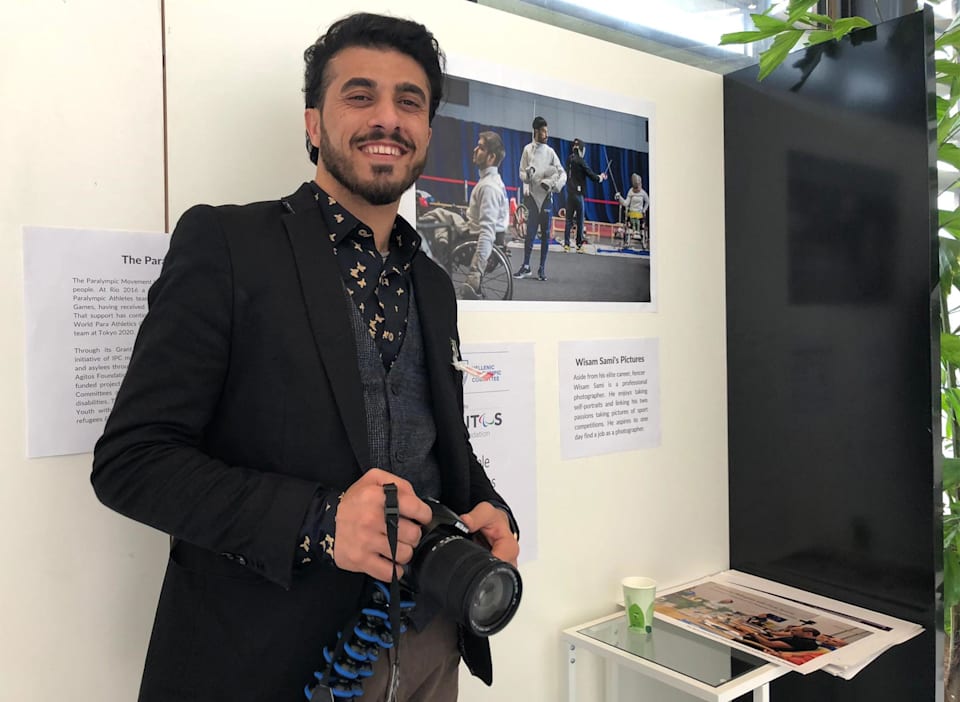Young refugee athletes tell their journeys ahead of Global Refugee Forum
Fencer Wisam Sami and boxer Farid Walizadeh are elite athletes. Sami fled Iraq, and now competes with Greece’s top Paralympic fencers. Walizadeh from Afghanistan is training in Portugal with the aim of qualifying and joining the IOC Refugee Olympic Team Tokyo 2020. Both have experienced the power of sport in helping them overcome the challenges they had to face when they were forced to flee from their homes. The two athletes today shared their journeys through sport at a session jointly organised by the International Olympic Committee (IOC), the Olympic Refuge Foundation (ORF) and the UN Refugee Agency (UNHCR) ahead of the Global Refugee Forum that will take place on 17 and 18 December.
The session led the audience through the various situations young refugees may face from the moment they are forced to leave their home. Six stories were presented to the participants, each of them demonstrating the positive role that sport has or continues to play in the lives of young refugees and their communities.
Talking about his experience, Walizadeh said: “Being a refugee thinking about the Olympics is like a dream. After losing everything I also lost hope, but this has given me the confidence to hope once again. Every morning when I wake up at 5am to train I think, ‘just one day more to show I can do it.’”
In addition to Sami’s and Walizadeh’s testimonials, examples of how sport engages and supports young refugees through sport within a safe and supportive environment were shared by the following organisations:
- Right to Play
- Women Win
- Hestia FC, Football Academy
- Perolas Negras
- Hellenic Paralympic Committee
- Agitos Foundation
- Portuguese Olympic Committee (National Olympic Committee)

“The partnership with the ORF is key to significantly strengthen and scale up our action with children and youth (in Jordan), educating, protecting and empowering them through sport,” said Dr Katrin Imhof, Chief Programmes Officer at Right to Play.
The event concluded on a note of hope, with moderator Mary Harvey, Chief Executive at the Centre for Sport and Human Rights, highlighting how the stories of adversity and resilience of refugee elite athletes Farid and Wisam were an inspiration to millions of displaced young people around the world, demonstrating the power that sport has to transform their lives.
Today’s side event was convened by the ORF in partnership with the IOC and UNHCR. Emerging from the strong and long-standing partnership with UNHCR, the ORF was founded by the IOC and launched during its Session in Lima in September 2017. The Foundation aims for one million forcibly displaced young refugees and young people to have access to safe sport by 2024.
The event took place on the eve of the Global Refugee Forum, which will officially kick off tomorrow in the presence of IOC President Thomas Bach. The Forum will bring together Member States, the private sector, civil society organisations and other key players, exchanging best practices and showcasing impactful pledges.
Ahead of the Forum, the ORF, in its unique position to be the backbone for sport for protection, has, together with the IOC and UNHCR, convened a sports coalition of more than 80 partners, all committing to providing refugees with access to sport. Three important pledges were officially put forward and will be officially announced by the IOC President on the first day of the Forum.
Around the world, roughly 70 million people, including a great proportion of children and young people, have fled their homes because of war or persecution. Sport can be a positive enabler for refugee protection, improving psychosocial well-being, social inclusion and social cohesion.